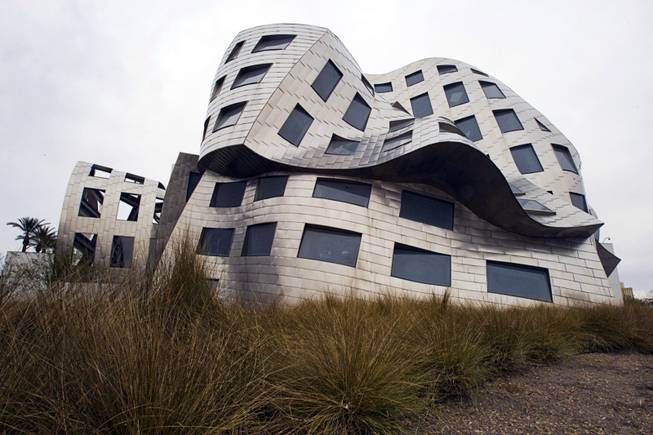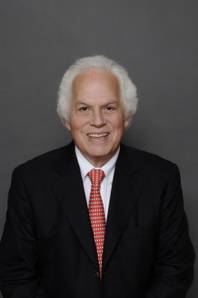
A view of the Cleveland Clinic Lou Ruvo Center for Brain Health Tuesday, February 7, 2012. The center was designed by architect Frank Gehry.
Saturday, Feb. 18, 2012 | 8 p.m.
Sun Archives
- Nobel laureate to chair Lou Ruvo Center scientific advisory panel (2-3-2012)
- Fighters embrace Ruvo Center project that tackles head trauma (2-15-2012)
- Ruvo Center taking strides in researching possible treatments for diseases (2-15-2012)
- Volunteering at the Ruvo Center: How to lend a hand — and a heart (2-14-2012)
- Lou Ruvo Center's world-class services are for locals, too (2-14-2012)
- Ruvo Center trial putting Parkinson’s patients on bikes (6-02-2010)
- Ruvo Center begins treating patients (7-17-2009)
- Brain institute’s first patient ‘the end of the beginning’ (6-14-2009)
- In Cleveland, patients are priority (2-17-2009)
- Ruvo’s mission is bold, driven by love (2-17-2009)
- Ruvo’s dream becomes real (2-17-2009)
- Aiming to revolutionize dementia research (1-7-2009)
- Brain institute thinking big (12-24-2008)
- Six-figure donation to be used to fight brain diseased (1-28-2008)
- Where I Stand — Guest columnist Larry Ruvo: Defeating Alzheimer’s (8-26-2005)

Dr. Stanley B. Prusiner, Nobel Prize-winning neurologist and biochemist, will become chair of the Cleveland Clinic Lou Ruvo Center for Brain Health's Scientific Advisory Board, the clinic announced Friday, Feb. 3, 2012.
Dr. Stanley Prusiner loves to solve puzzles.
In Las Vegas, he’ll try to solve one of the biggest puzzles of the medical profession.
“It was fascinating for me to go in every day and have the puzzle pieces laid out and to keep putting them together to find the solution,” said Prusiner, the Nobel laureate who will chair the Scientific Advisory Board of Las Vegas at the Cleveland Clinic Lou Ruvo Center for Brain Health. “It dawned on me late in medical school that there were people who were paid to solve puzzles.
“Lots of people sit around and solve crossword puzzles in the morning. They’re entertained, and they love it. But some people are paid to be entertained. They’re scientists.”
Prusiner will work with a team at the Ruvo Center to solve this puzzle: How do you best treat patients suffering from Alzheimer’s disease?
As the director of the Institute for Neurodegenerative Diseases and professor of neurology at the University of California, San Francisco, Prusiner won the Nobel Prize in Physiology or Medicine in 1997 for his research on the cause of mad cow disease — bovine spongiform encephalopathy — and its human equivalent, Creutzfeldt-Jakob disease.
Now that he’s formed a relationship with the Ruvo Center, he’ll live in San Francisco but will make numerous trips to Las Vegas to collaborate with the staff.
“Our dream is that the work in San Francisco and the work at the Lou Ruvo Center will converge when we are able to create effective drugs — and the word “effective” is really important — for the treatment of Alzheimer’s disease,” Prusiner said in an interview with the Sun days before Saturday’s official announcement of his association with the institute. The announcement will be made in conjunction with the Keep Memory Alive Power of Love Gala at the MGM Grand, honoring Muhammad Ali and serving as a fundraiser for the Ruvo Center and the Muhammad Ali Center.
Prusiner said Aricept, the common drug of choice for Alzheimer’s patients, treats the symptoms of the disease but becomes ineffective over time.
“As we are able to develop new drugs that are effective in animal models, we hope to bring them up to early clinical studies that would be done with patients at the Ruvo center because it’s developing world-class expertise in clinical trials,” Prusiner said. “That expertise is emerging at the Ruvo center because Larry Ruvo was impressive to go out not to hire good doctors, but the best doctors in Alzheimer’s treatment.”
Prusiner specifically cited the work of Dr. Jeffrey L. Cummings, director of the Ruvo Center, an experienced clinician with expertise in trial design and analysis, global trial implementation and trial outcome measures, and Dr. Kate Zhong, the senior director of clinical research and development, who has brought more than 16 years of clinical and pharmaceutical research experience to the center.
Cummings has been particularly impressed with Prusiner’s work on prions — infectious agents linked to degenerative ailments like Alzheimer’s and Parkinson’s.
“The acceptance of this appointment by Dr. Prusiner will open many doors for us in the scientific community, allowing greater collaboration and more opportunities for breakthroughs,” Cummings said. “His research on prions, for which he was awarded the Nobel Prize, is enormously important. We are beginning to believe that many aspects of Alzheimer’s disease and other neurodegenerative disorders behave in a manner similar to prions.”
Prusiner was asleep when the call came that he had won the Nobel Prize.
“I was attending an FDA (Food and Drug Administration) drug-safety meeting as an adviser,” he said. “At 4 in the morning, I got a phone call. The secretary of the Nobel committee described to me that they had just finished voting and that they wanted to give me the prize. I was in shock. I knew there was a lot of interest, but you just don’t know what happens.”
He said it was common for people to seek information about research, so he never suspected those awarding the prize could be gathering information about his work.
“There are times that people have gotten it that had no idea that they were getting it,” he said. “It’s very rare when they take somebody that’s never won any other prize and give them the Nobel Prize just out of thin air. It’s not like Publisher’s Clearinghouse.”
Prusiner plans a significant presence in Las Vegas.
“What we envision is creating very close ties and me being here a lot, but what ‘a lot’ is I can’t say yet,” he said. “But we can interact every day by email and by telephone.”
He also plans annual or biannual meetings to bring the world’s top researchers to Las Vegas to discuss the progress — or lack of progress — in Alzheimer’s research.
Prusiner hasn’t explored some of the other diversions of Las Vegas, which he described as “a continuous carnival,” but plans to bring his girlfriend to the city next month to celebrate her birthday. He said when he tells colleagues and friends that some of his work will be done in Las Vegas, they immediately grasp that it’s because of the reputation of Cummings, Zhong and the Cleveland Clinic.
“Everybody has opinions about Las Vegas, but they’re totally blunted by Jeff Cummings’ reputation,” he said. “Nobody even asks about (Las Vegas not being a serious place for research). Larry (Ruvo) was a genius figuring out how to do these things. He created something that I bet there wasn’t another person in Las Vegas could have created. Forget about the Frank Gehry (award-winning architect of the building that houses the center) connection. I don’t think there was another person who would have gone out and figured out how to hire two more stellar people to run the institute. It’s fabulous.”
With the center’s reputation firmly established, could Las Vegas someday become a center for medical tourism as envisioned by the local medical community and economic development leaders?
Prusiner admits he doesn’t have the answer.
“One of the things you learn if you’re lucky enough to win a Nobel Prize is that people think you’re an expert about everything,” he said. “But if you’re smart, you learn very quickly not to answer things that you know nothing about.
“And that’s something that I know nothing about, so you’re asking the wrong person.”

Join the Discussion:
Check this out for a full explanation of our conversion to the LiveFyre commenting system and instructions on how to sign up for an account.
Full comments policy